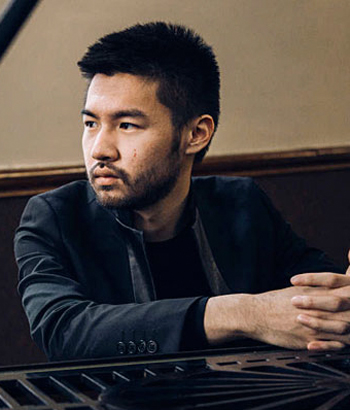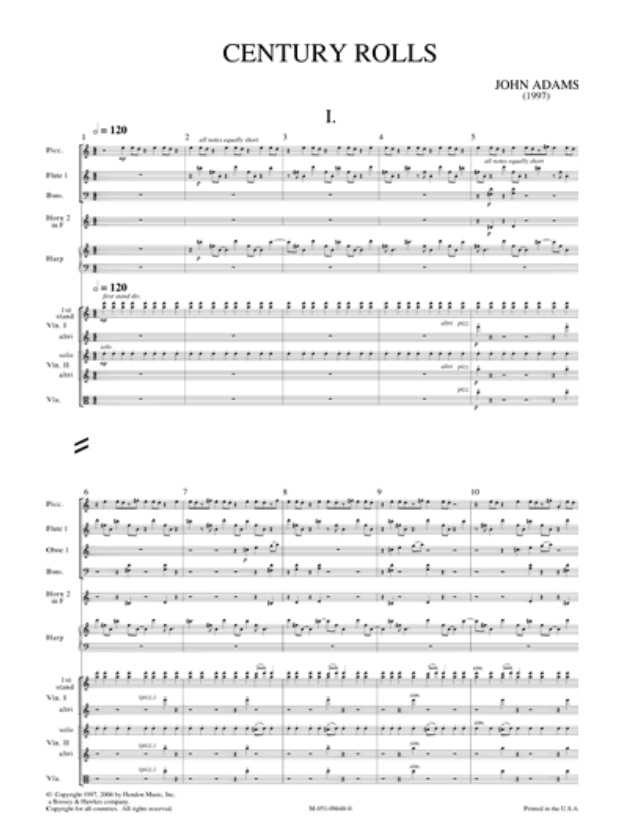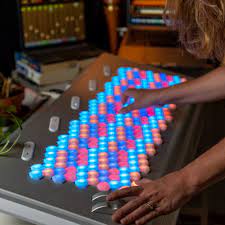by Mike Telin

On Saturday, August 5 at 7:00 pm at Blossom Music Center, Tao will perform Century Rolls with David Robertson and The Cleveland Orchestra. The program also includes Sarah Kirkland Snider’s Something for the Dark, and Sibelius’ Symphony No. 1. At 6:00 pm, Daniel Reith will lead the Kent Blossom Chamber Orchestra in Beethoven’s Overture to The Creatures of Prometheus, Gabriel Fauré’s Pavane, and Sergei Prokofiev’s Symphony No. 1 “Classical.” Tickets are available online.
During our Zoom conversation, the pianist said that the rolls component of Century Rolls refers to the sound and character of piano rolls. “I think that is the starting point for the whole piece, and accordingly, there is an almost digital quality to the writing.”
Piano rolls have been in production since 1896 and the playing of many composer/pianists, including Gershwin, Debussy, and Rachmaninoff, has been preserved by the technology. “I know that Conlon Nancarrow composed using piano rolls as a technology that could execute music that really is physically unplayable, or certainly at the edge of unplayable. And Nancarrow’s contribution is a nearly inhuman mechanical music making. And so I think that in some ways, Century Rolls is asking a question about what is possible with mechanical tools.”
When playing the three-movement concerto, Tao often finds himself thinking about electronic dance music and its unique, expressive pulse. “I’m also tapping into a kind of mechanical sound world — that insistent, visceral brightness of a player piano. And I think all of that contributes to the story that is being told in the piece.”
Regarding the work’s title, Tao said that from a 2023 standpoint, he is inclined to think of it as an integration of technology. “But I suspect that in 1997, when the piece was composed, it was a celebration of technology. I feel like the title suggests that, too. Century Rolls — time rolls on frighteningly fast. And technological development is one area where we start to feel history and time passing us by in an anxious way.
“So I feel that, emotionally, it is a huge part of the piece. Both this kind of celebratory reveling in awe of what the 20th century accomplished, and then perhaps a twinge of nervousness in the midst.”
What Tao finds fascinating about piano rolls is that the technology is still in use today. “I remember when I first heard some Gershwin piano rolls, I was thinking — how big were his hands? Then I realized it’s because you can keep punching holes in those piano rolls. And I find it really interesting that this technology is huge in music production software. If you’re recording MIDI information on a keyboard, that information still usually shows up in piano roll notation — and we still call it that. Because the original piano rolls were designed to be played on player pianos, it’s both a fundamentally digital technology and a fundamentally analog one.”

For this performance, Tao said he’s really been paying attention to the voice leading that’s within the harmonies. “I’m finding that to be a very elegant component of the piece.”
Tao, who seems to have a never-ending stream of interesting projects, is no stranger to Northeast Ohio audiences. He made his area debut in 2015 with his “Pictures” project for Akron’s Tuesday Musical. In 2019 he performed Prokofiev’s Piano Concerto No. 3 with The Cleveland Orchestra conducted by Jahja Ling, and in 2021 he joined his Junction Trio colleagues violinist Stefan Jackiw and cellist Jay Campbell for the Cleveland Chamber Music Society. And most recently, in September 2022, Tao and choreographer/dancer Caleb Teicher brought their “Counterpoint” project to Baldwin Wallace Conservatory.
What keeps his artistic fire burning? “I think part of it is related to starting so young — from the age of five onward, I was really enmeshed in classical music in my training. And in some ways, that made me resistant to thinking of it as a default.”
He apologized for leaving out a crucial fact — he also began his training in composition and music theory when he was five. And at age nine, he moved to New York and started working with Christopher Theofanidis, who he called a great composer in his own right.
“Very early on in our working together, Chris started bringing me music to listen to and scores to look at. Hearing John Adams’ Chamber Symphony when I was ten completely blew my world open,” Tao said. “And Steve Reich’s Tehillim was another such piece. Chris gave me a real gift by exposing me to all of this music. It showed me that there was so much happening beyond the standard repertoire of the piano world. So I think all of those things combined with my traditional, canonical classical education made me realize that there was a much broader spectrum of work out there.”
Tao said that being a composer also shapes his approach to curating a recital program. “For me, it’s not terribly exciting to think of the recital as just a container with a given structure or meaning. Without ignoring those conventions, I want to see what I can do to make it exciting and interesting for myself. Of course that’s guided by the belief that a surprise, or just seeing a different perspective on something, will be a fun experience for others as well.”
And what does Tao’s creative docket have in store for the near future? He recently completed a concerto for the brass quartet The Westerlies, to be premiered this fall by the Orlando Philharmonic. “I’m also writing a new work in observation of the centennial of Rhapsody in Blue with the original Paul Whiteman jazz band instrumentation. That’s being premiered by the Santa Rosa Symphony, as well as in Aspen and a couple of other places.

Published on ClevelandClassical.com August 1, 2023.
Click here for a printable copy of this article



